For the 1988-89 season Turek joined the second division club VTJ Pisek, with whom he would play for two seasons. He would also participate in both the 1989 and 1990 IIHF World Junior Tournaments, earning a pair of bronze medals in the process.
He returned to HC Ceske Budejovice for the 1990-91 season, where he saw action in 26 games. Budejovice was relegated to the second division for the 1991-92 season, but were promoted back to the top division for 1992-93. By now Turek had taken over as the team's number one netminder and left little but scraps for his fellow goaltenders as he played 43, 44 and 44 games of the shorter European schedule and earning Czech Player of the Year honors in 1994.
Internationally, the world was in a state of change, particularly in eastern Europe. One major change was the division of Czechoslovakia into the Czech Republic and Slovakia. Turek, born in Strakonice in the western side of the Czech half of the country, would play for the Czech Republic going forward, beginning with the 1993 World Championships where he won a bronze medal. In 1994 Turek made his Olympic debut followed later in the spring with a second World Championship. He returned for the World Championships again in 1995 where he earned a berth on the tournament All-Star Team.
Turek took his game to Germany for the 1995-96 season as he joined the Nürnberg Ice Tigers of the DEL in what proved to be a busy year. He first set a new career high in games played with 48 before backstopping the Czechs to a gold medal at the 1996 World Championships with a 1.88 goals against average in 8 games played, earning not only tournament all-star recognition, but also being named the tournament's Best Goaltender. Later that fall Turek was the Czechs starting goaltender for the inaugural World Cup of Hockey.
His career took a dramatic turn for the 1996-97 season. Having been drafted by the Minnesota North Stars in 1990, who had subsequently moved to Dallas in 1992, Turek came to North America and spent most of the year getting acclimated to the culture and style of hockey on this side of the Atlantic as he played with the Michigan K-Wings of the International Hockey League. He would also make his NHL debut with 6 games for the Dallas Stars, making a fine showing with a 2.05 goals against and a 93% save percentage in six appearances.
He played 23 games with Dallas in 1997-98 as a backup to Ed Belfour, winning 11. In 1998-99 Turek went 16-3-3 in 26 games with the Stars, who went on to win the Stanley Cup that season.
Turek was dealt to the St. Louis Blues over the summer, where he immediately became their number one, playing in 67 games and setting an immediate career high with 42 wins as well as a career best 1.95 goals against average, which won him his second consecutive Jennings Trophy. He would play one more season with St. Louis before being dealt to the Calgary Flames in exchange for three players.
The Flames rode Turek for the 2001-02 season, which allowed him to establish a career high of 69 games, followed by 65 the following season. During that season he also made his second trip to the Olympics with the Czech Republic. The 2003-04 season saw a lot of competition for playing time in the Calgary nets, with Turek playing in 18 games while competing for playing time with Jamie McLennan and Miikka Kiprusoff.
This would prove to be the end of Turek's NHL career, as he returned to Ceske Budejovice for the 2004-05 season while the NHL lockout was in progress to help the club gain a promotion out of the second division.
He remained with Budejovice for the next five years from 2005-06 through 2009-10, including winning Czech Extraliga Player of the Year in 2008 before his retirement. He later became first Budejovice s goaltending coach and then team president in 2013.
Today's featured jersey is a 1996 Czech Republic National Team Roman Turek jersey, a one year only style worn by Turek and the Czechs as they won their first World Championship playing as an independent nation following the division of Czechoslovakia. Somewhat unique to the Czechs, their goaltenders were often assigned the numbers 1 and 2, while most nations traditionally gave out #2 to defensemen.
Todays video section begins with a pair of videos from the gold medal game of the 1996 World Championships, the first being the introduction of the Czech squad and the second a highlight video showing the Czechs defeating Canada to capture an emotional World Championship, their first as the Czech Republic since the division of Czechoslovakia just three years earlier.

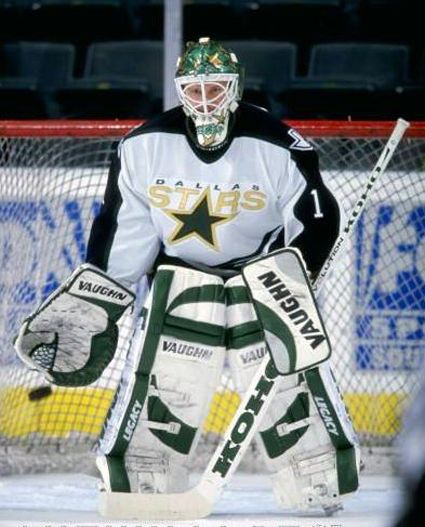
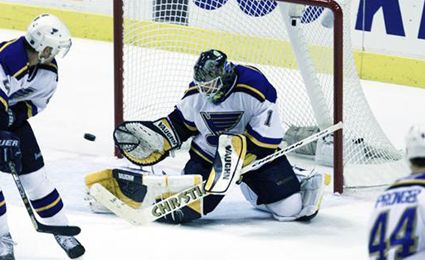
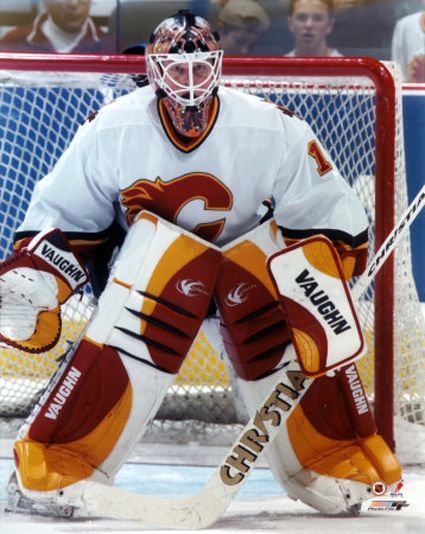
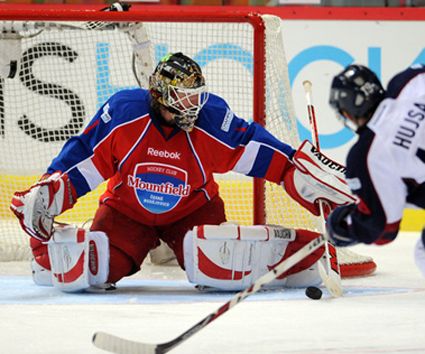
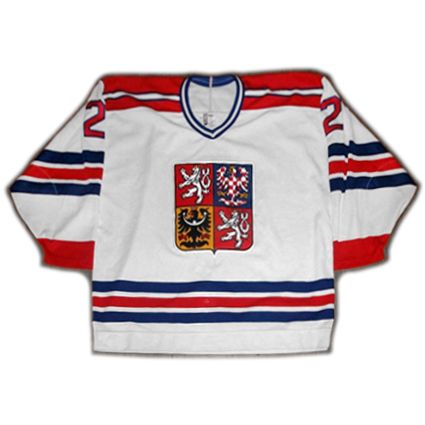
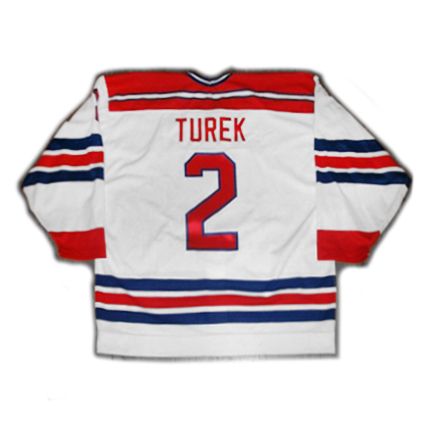










No comments:
Post a Comment
We welcome and encourage genuine comments and corrections from our readers. Please no spam. It will not be approved and never seen.